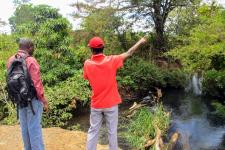The Concept, Practice, Application, and Results of Locally Based Monitoring of the Environment

Attempts to monitor and deal with climate change and environmental degradation normally draw on conventional scientists and experts. But research on community-based monitoring and “citizen science” show that local knowledge can contribute key insights and evidence for informed decision-making on the environment.
A new article on locally based monitoring summarizes findings from 20 years of collaborative research in a number of countries. The article describes the potential for environmental monitoring by local community members to deliver reliable knowledge independently of external experts, and how this can be used to inform timely environmental decision-making at local and national levels.
Ultimately, this knowledge can also be used on a global scale: Expanding the scientific base to include community members or citizen scientists can provide multiple, fine-scaled data points on environmental change that can enhance cumulative insights across regions, thereby potentially also contributing to overall monitoring of global progress on biodiversity, climate change and other environmental agendas.
Community-based environmental monitoring furthermore has the potential to empower local rightsholders and stakeholders through their broader inclusion in the scientific process, which tends to be dominated by conventional – and mainly Western – science.
If community members’ role is broadened from gathering data to also asking questions, identifying priorities, interpreting information, putting it into context, and communicating their findings and proposed management actions, the results can transform the understanding of how large-scale environmental change plays out on the ground, and enhance democratic environmental governance.
The article is the result of collaboration between the Nordic Agency for Development & Ecology, the UNEP World Conservation Monitoring Centre, University of Copenhagen, and DIIS.
The article can be downloaded free of charge here: https://doi.org/10.1093/biosci/biab021.
For more information please see the UNEP WMC press release here: https://www.unep-wcmc.org/news/citizen-scientists-and-local-community-monitoring-input-is-key-to-halting-biodiversity-loss
DIIS Eksperter
